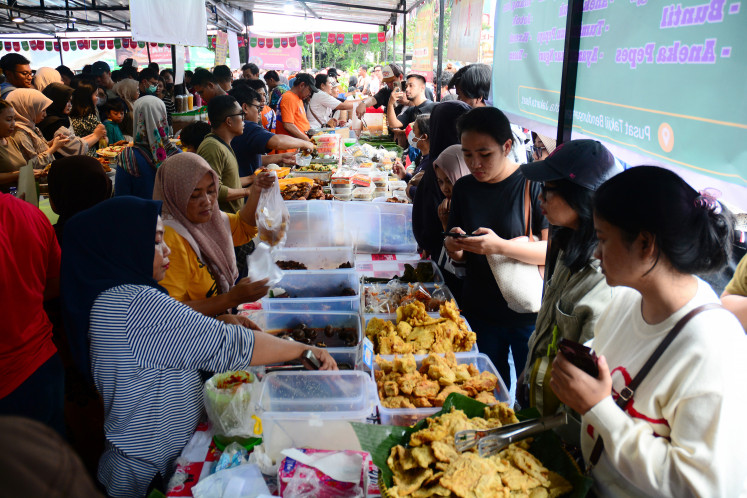Popular Reads
Top Results
Can't find what you're looking for?
View all search resultsPopular Reads
Top Results
Can't find what you're looking for?
View all search resultsHSBC affirms commitment to support Indonesia’s EV growth
Change text size
Gift Premium Articles
to Anyone
A
s the global electric vehicle (EV) industry continues its inexorable, rapid growth, we spoke to Noor Adhami, Global Head of International Banking at HSBC on her views about the unique and dominant role Indonesia plays in this sector and HSBC’s commitment to support companies wanting to not just tap into this sector but also into the broader growth opportunities Indonesia offers.
“As one of the economic powerhouses in Southeast Asia, with a GDP of over US$1 trillion, an unrivalled position having the greatest nickel and the third-largest cobalt reserves, and a growing domestic consumer base, Indonesia is fast becoming a pivotal hub in the EV sector and an attractive site for foreign investment”.
Speaking at the 2024 HSBC Investment Forum themed, “Electrifying Indonesia: Unleashing the Potential of Electric Vehicles Ecosystem” in Jakarta on 20 March, Adhami also talked about the abundant investment opportunities available in the entire EV supply chain, all in service to ensure a robust and comprehensive ecosystem” for this sector.
This Forum which brought together leading industry experts, policymakers, companies and investors was key in fostering closer collaboration and discussion around sectoral trends as well as ways to further unlock Indonesia’s full potential to be a leading and sustainable player in this industry.
In the kick off session, the Office of the Coordinating Minister of Investment and Maritime revealed that Indonesia is now the number one producer of passenger cars.
“Indonesia is no doubt in an enviable position. With its status as the largest automotive market in ASEAN, as well as the second-largest overall automotive producer after Thailand, the strong FDI flows into the country and global interest in EVs and renewables, Indonesia is well positioned for growth. And HSBC, as the leading international bank in ASEAN, is keen to support both local and foreign corporates investing in this sector. Adhami added.
Balancing act
On its path to achieving net zero emissions by 2060 or sooner, the Indonesian government has set an ambitious target of producing 2.2 million electric cars and 13 million electric bicycles by 2030.
The country has a projected EV battery production capacity of 140 gigawatt-hours, while its projected EV production capacity per year is 600,000 electric cars and 2.5 million electric motorcycles.
Market analysts expect Indonesia’s total addressable market for EVs to exceed US$20 billion by 2030, while the nickel and EV downstream industries could contribute 0.5 percentage point in GDP growth to reach 5.8 percent by 2028.
Indonesia is also expected to grow over the next decade as it climbs up the manufacturing value chain from ores to processed metals and EVs, all of which have tremendous potential to attract foreign direct investment (FDI).
Acknowledging the incredible opportunities that the EV industry offers, important to note that processing nickel for use in EV batteries carries a high carbon footprint. As such, Adhami advises investors to integrate sustainable processes and technology into their operations and investment decisions to avoid adverse environmental consequences.
Another angle to consider is competitiveness of Nickel batteries against their competitor; lithium ferrophosphate (LFP) batteries. The latter are a cheaper alternative and will be targeting cost-sensitive markets.“Over time, investors will also need to pay attention to continuous technological innovation to make nickel-based batteries more competitive,” she added.
‘Exciting’ market
Indonesia generated nearly 36 percent of ASEAN’s GDP, attracted a record high of USD47bn in 2023 and contributes around 41 percent of the region’s population.
In addition, she noted that its young population and rapidly growing middle class would create future demand and fuel the economy even further.
“That is super interesting for foreign investors; it is a market that is hungry for more, demand and consumption are expected to keep on going up because the demographics are so favorable,” Adhami explained.
The HSBC Global Connections study found that 25 percent of firms surveyed from selected major economies planned to expand into Indonesia over the next two years, while 68 percent of firms already operating in the country planned to prioritize growth.
The survey also discovered that 29 percent of international businesses in Indonesia were attracted by its increasing domestic consumer income, particularly in view of its demographic dividend: Over 70 percent of the country’s 273 million population in 2021 are aged between 15 and 64, and it has an affluent middle class of 64 million people.
In addition to its market size and wealth of natural resources, another key differentiator is Indonesia’s increasingly foreign investor-friendly regulations and incentives which significantly contributed to driving FDI flows into the country
Key partner
“This year, HSBC is pleased to celebrate 140 years in Indonesia. This is a critical market for us and therefore we are the only international bank that is truly universal with a full suite of products and services. We have long standing relationships with clients and we’ve been working closely with them over the years to tap the exciting growth prospects both in and out of the country. said Adhami.
Navigating the complexities of the ASEAN region is not easy and Adhami’s International Banking Team is there to help clients navigate new waters. Wherever foreign investors go, Adhami’s advice remains the same: Local know-how is extremely important.
This is why partnering with a bank that understands the ins and outs is among the most important steps before entering a new market, she emphasized.
“We are well connected in the market and work closely with the government bodies; we have a very close relationship with various Chamber of Commerce and Industry bodies and strong partnership with the Ministry of Investment. We are also well connected across our HSBC network and our colleagues outside of Indonesia help us understand what’s on the foreign investors’ mind,” she said.
Besides having the right networks and partnerships, it is also critical to offer best in class services and solutions. For example, instead of opening accounts in multiple jurisdictions and having to deal with disparate regimes, HSBC is a one-stop shop and offers one contact point across the entire region. In closing, Adhami remains optimistic about the growth prospects for the country. “Indonesia is golden in every way. This truly is Indonesia’s time.”











